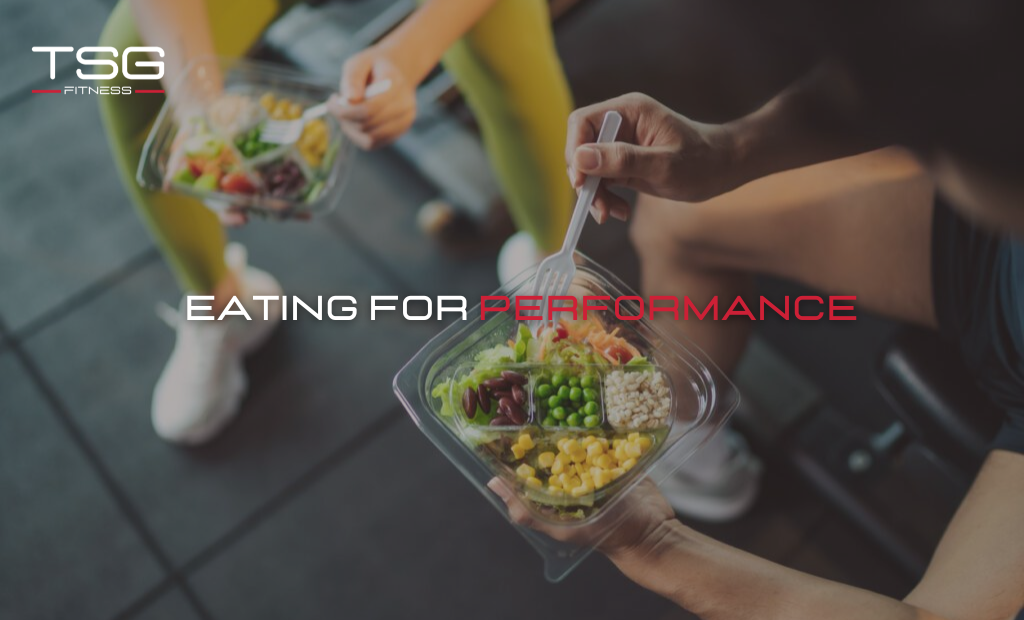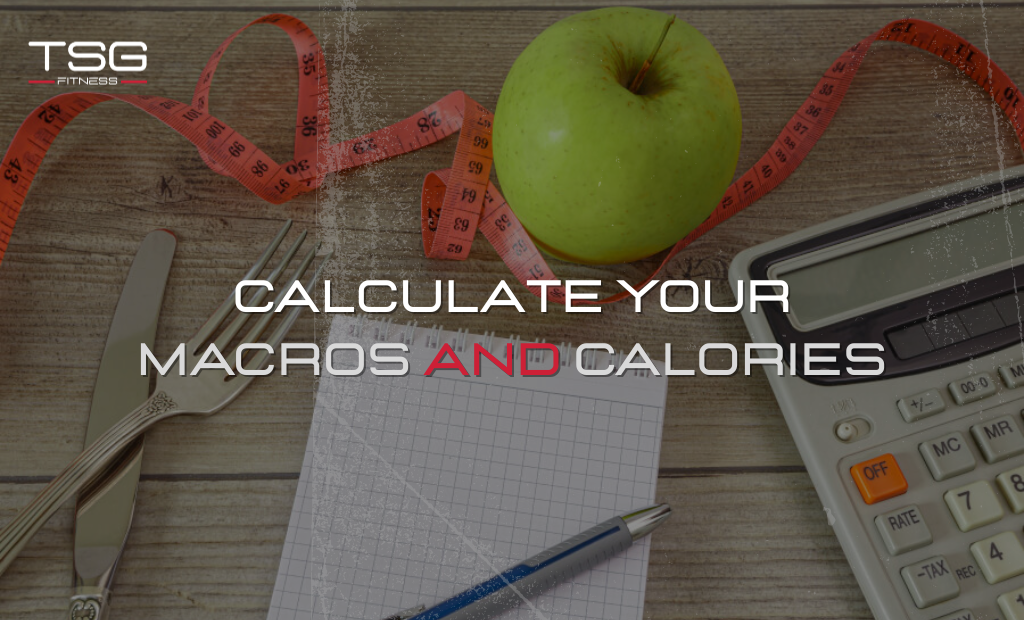
Eating for Performance: Timing, Portions, and Supplements Explained
Athletic performance depends on more than just training—it requires strategic nutrition that fuels your body before, during, and after exercise. At TSG Fitness, we understand that optimal performance nutrition isn’t about following generic guidelines, but rather implementing personalized timing, portions, and supplementation strategies that align with your training demands, body composition goals, and metabolic needs.
The Science of Nutrient Timing
Nutrient timing—when you consume specific macronutrients and supplements relative to exercise—can significantly impact performance, recovery, and adaptation. Research demonstrates that strategic timing optimizes muscle protein synthesis, glycogen replenishment, and overall training adaptations beyond what random eating patterns can achieve.
The human body operates on predictable metabolic cycles that respond differently to nutrients depending on exercise status, circadian rhythms, and training history. Understanding these patterns allows athletes to maximize the anabolic window, minimize catabolism, and enhance both immediate performance and long-term adaptations.
Pre-Exercise Nutrition: Fueling for Performance
Timing Your Pre-Workout Meal
The optimal pre-exercise meal timing depends on meal size, individual tolerance, and exercise intensity. Research suggests consuming substantial meals 3-4 hours before training, moderate meals 2-3 hours prior, and light snacks 30-60 minutes before exercise.
3-4 Hours Before Training:
- 300-400g carbohydrate-rich meal with moderate protein and minimal fat
- Example: Grilled chicken (150g) with rice (200g cooked) and steamed vegetables
- Allows complete digestion while maximizing glycogen storage
1-2 Hours Before Training:
- Light meal combining easily digestible carbs with lean protein
- Example: Banana with almond butter or Greek yogurt with berries
- Provides readily available energy without gastrointestinal distress
30-60 Minutes Before Training:
- Simple carbohydrates for immediate energy
- Example: Dates, sports drinks, or banana
- Focuses on quick-release glucose for high-intensity efforts
Pre-Exercise Macronutrient Targets
Carbohydrates: 1-4g per kg body weight depending on exercise duration and intensity. Endurance athletes require higher amounts, while strength athletes need moderate carbohydrate intake focused on glycogen optimization.
Protein: 0.25-0.4g per kg body weight to prime amino acid availability and support muscle protein synthesis during and after exercise.
Fats: Minimize intake within 2 hours of training to prevent delayed gastric emptying and potential digestive discomfort during exercise.
During-Exercise Nutrition: Sustaining Performance
Exercise Duration Guidelines
< 60 Minutes: Water is typically sufficient for hydration. Carbohydrate mouth rinsing may provide ergogenic benefits for high-intensity efforts without requiring ingestion.
60-120 Minutes: 30-60g carbohydrates per hour from sports drinks, gels, or easily digestible foods. Focus on glucose or maltodextrin for rapid absorption.
> 2.5 Hours: 90g carbohydrates per hour using multiple transportable carbohydrates (glucose:fructose ratio of 2:1) to maximize absorption and prevent gastrointestinal distress.
Hydration Strategies
Maintain fluid balance by drinking 150-250ml every 15-20 minutes during exercise. For sessions exceeding 60 minutes or in hot environments, choose beverages containing 6-8% carbohydrate concentration with sodium (300-500mg per liter) to enhance absorption and maintain electrolyte balance.
Post-Exercise Nutrition: Optimizing Recovery
The Anabolic Window
While the post-exercise “anabolic window” was once thought to be narrow (30-60 minutes), current research suggests a broader timeframe of 2-4 hours for maximizing muscle protein synthesis and glycogen replenishment. However, consuming nutrients sooner rather than later optimizes recovery, especially when the next training session occurs within 8-12 hours.
Post-Exercise Macronutrient Targets
Protein: 20-40g high-quality protein containing all essential amino acids. Younger athletes may benefit from 20-25g, while older athletes (40+) require 30-40g to overcome anabolic resistance.
Carbohydrates: 1.2g per kg body weight within 30-60 minutes post-exercise, followed by regular carbohydrate feeding every 2 hours until normal meal patterns resume. This protocol maximizes glycogen synthesis rates.
Fats: While not immediately essential post-exercise, including moderate healthy fats in recovery meals supports hormone production and nutrient absorption of fat-soluble vitamins.
Optimal Food Combinations
Immediate Post-Workout (0-30 minutes):
- Whey protein shake with banana
- Chocolate milk (2:1 carb to protein ratio)
- Greek yogurt with berries and honey
Complete Recovery Meal (1-2 hours post-exercise):
- Grilled salmon with quinoa and roasted vegetables
- Lean beef stir-fry with brown rice
- Egg omelet with sweet potato and spinach
Strategic Supplementation for Performance
Evidence-Based Performance Supplements
Creatine Monohydrate
- Dosage: 20-25g daily for 5-7 days (loading), then 3-5g daily (maintenance)
- Timing: Post-exercise with carbohydrates and protein for enhanced uptake
- Benefits: Increased power output, strength, and muscle mass
- Duration: Effective with chronic use (4-12 weeks minimum)
Caffeine
- Dosage: 3-6mg per kg body weight
- Timing: 60-90 minutes pre-exercise for peak plasma levels
- Benefits: Enhanced focus, reduced perceived exertion, improved endurance
- Considerations: Individual tolerance varies; avoid late-day consumption affecting sleep
Beta-Alanine
- Dosage: 3-6g daily in divided doses
- Timing: With meals containing carbohydrates and protein to reduce tingling
- Benefits: Improved muscular endurance and reduced fatigue during high-intensity exercise
- Duration: 4-10 weeks of consistent supplementation required for muscle carnosine saturation
Beetroot Juice (Nitrates)
- Dosage: 5-9 mmol nitrates
- Timing: 2-2.5 hours pre-exercise for peak nitric oxide production
- Benefits: Enhanced endurance performance and reduced oxygen cost of exercise
- Duration: Can be used acutely or chronically (up to 28 days)
Recovery-Focused Supplements
Whey Protein
- Dosage: 20-25g post-exercise
- Timing: Within 2 hours post-exercise, ideally immediately after training
- Benefits: Rapid amino acid absorption and muscle protein synthesis stimulation
Casein Protein
- Dosage: 20-40g
- Timing: Before bed for overnight muscle protein synthesis
- Benefits: Sustained amino acid release during sleep
Omega-3 Fatty Acids
- Dosage: 1-3g EPA+DHA daily
- Timing: With meals for enhanced absorption
- Benefits: Reduced inflammation, improved recovery, and joint health
Portion Control and Individualization
Calculating Individual Needs
Performance nutrition portions must account for body weight, training volume, intensity, and individual metabolic factors. Use the following framework as a starting point, then adjust based on performance outcomes and body composition changes:
Daily Protein: 1.6-2.2g per kg body weight for strength athletes, 1.2-1.6g per kg for endurance athletes
Daily Carbohydrates: 5-7g per kg for moderate training, 7-10g per kg for high-volume training, 10-12g per kg for ultra-endurance training
Daily Fats: 0.8-1.2g per kg body weight to support hormone production and cellular function
Adjusting for Training Phases
Base Training Period:
- Moderate carbohydrate intake (5-7g/kg)
- Consistent protein intake (1.6-2.0g/kg)
- Higher fat intake for metabolic flexibility
Competition Preparation:
- Increased carbohydrate intake (7-10g/kg)
- Maintained protein intake for muscle preservation
- Strategic carbohydrate loading 3-7 days before competition
Off-Season/Recovery:
- Reduced overall caloric intake
- Maintained protein for muscle preservation
- Focus on nutrient density and metabolic health
Meal Planning and Practical Implementation
Sample Daily Nutrition Timeline
6:00 AM – Pre-Morning Training:
- 1 banana with 1 tbsp almond butter
- 200ml water
7:30 AM – Post-Training:
- Whey protein shake (25g) with 300ml milk
- 1 large banana
9:00 AM – Breakfast:
- 3 whole eggs + 2 egg whites
- 80g oats with berries
- 1 slice whole grain toast
12:00 PM – Lunch:
- 150g grilled chicken breast
- 150g sweet potato
- Mixed green salad with olive oil dressing
3:00 PM – Pre-Afternoon Training:
- 2 dates + green tea
5:30 PM – Post-Training:
- Chocolate milk (500ml)
- Handful of mixed nuts
7:00 PM – Dinner:
- 150g salmon
- 100g quinoa
- Steamed broccoli and asparagus
9:30 PM – Before Bed:
- 200g Greek yogurt with 1 tbsp honey
Special Considerations
Female Athletes: Account for menstrual cycle impacts on iron needs, carbohydrate metabolism, and protein requirements. Consider higher protein intake during luteal phase.
Masters Athletes (40+): Increase protein targets to 1.6-2.4g/kg to overcome anabolic resistance. Prioritize anti-inflammatory foods and recovery-focused supplementation.
Weight-Class Athletes: Periodize nutrition around competition schedules with strategic dehydration/rehydration protocols and carbohydrate manipulation.
Optimizing performance through strategic nutrition requires understanding the interplay between timing, portions, and supplementation. While individual needs vary, the principles outlined provide a science-based framework for fueling training, enhancing recovery, and achieving peak performance. Remember that consistency and personalization trump perfection—focus on implementing sustainable strategies that support your unique training demands and lifestyle requirements.
Ready to revolutionize your performance nutrition? Contact TSG Fitness today to schedule a comprehensive sports nutrition consultation and develop your personalized fueling strategy for optimal athletic performance.
Frequently Asked Questions
How important is meal timing compared to total daily intake?
While total daily macronutrient intake accounts for approximately 80% of nutrition’s impact on body composition and performance, strategic timing can enhance training adaptations by 15-20%. Timing becomes more critical as training intensity and frequency increase.
Can I train fasted for fat loss benefits?
Fasted training may enhance fat oxidation during the exercise session but doesn’t necessarily improve 24-hour fat loss compared to fed training. Consider fasted training for low-intensity sessions but fuel high-intensity workouts for optimal performance and muscle preservation.
What’s the best protein source post-workout?
Whey protein offers the fastest absorption and highest leucine content, making it ideal for immediate post-exercise consumption. However, whole food sources like eggs, chicken, or fish can be equally effective when consumed within the broader 2-4 hour window.
Should I take supplements on rest days?
Daily supplements like creatine, vitamin D, and omega-3s should be taken consistently regardless of training status. Acute supplements like caffeine or beetroot juice are typically reserved for training days only.
How do I know if my nutrition timing is working?
Monitor performance metrics (strength, endurance, power output), recovery markers (sleep quality, muscle soreness, motivation), and body composition changes. Consistent improvements across these areas indicate effective nutrition timing.
What about intermittent fasting and athletic performance?
While intermittent fasting can support metabolic health and body composition goals, it may compromise high-intensity training performance if eating windows don’t align with training demands. Athletes should prioritize performance nutrition over fasting protocols during competitive seasons.
How much water should I drink during training?
Aim for 6-8ml per kg body weight every 15-20 minutes during exercise. A 70kg athlete should consume approximately 400-550ml per hour, adjusted for sweat rate, environmental conditions, and exercise intensity.
When should I consider working with a sports nutritionist?
Consider professional guidance when competing at high levels, struggling with body composition goals, experiencing recurring digestive issues, or needing sport-specific periodization strategies. At TSG Fitness, our registered dietitians specialize in performance nutrition for serious athletes.



